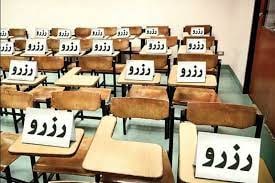Entrance Exam Quotas: A Major Barrier for Exam Takers
Iran’s Minister of Science, Research, and Technology defended some entrance exam quotas and said, ‘I fully agree with the quota for the children of martyrs.’ On Sunday, August 14, Mohammad Zolfigol, the Minister of Science, defended the entrance exam quotas for the children of martyrs, stating, ‘I do not agree with all quotas, but I fully support the quota for the children of martyrs.’ He explained that the children of martyrs do not have normal conditions and do not enjoy the same justice as others, so a broader perspective is needed.
The Mafia Behind the Entrance Exam
The aftershocks of this year’s controversial entrance exam remain strong, from leaked exam questions and early receipt of answer sheets in some testing centers to discussions about the mafia behind the exam and the increase in quotas. The demand to eliminate various quotas, including those for veterans, martyr families, nursing, and regional quotas, from the national exam has been a longstanding request of university applicants over the past few decades, creating challenges for those seeking university admission. This protest has persisted over the years.
Discriminatory Quotas
According to the quotas listed in the national entrance exam booklet, veterans with 25% disability and above, their spouses, and children, as well as veterans with less than 25% disability, their spouses, and children, and freed prisoners of war and their spouses and children can use these quotas. The spouses and children of combatants with at least six months of voluntary presence on the front lines, as well as the spouses and children of martyrs and missing persons, are also eligible for the veteran quota. They can use this quota if they achieve at least 70% of the score of the last admitted candidate in the open selection. For years, some intellectuals have criticized the way these quotas are implemented. According to them, university graduates often lack the necessary skills to enter the job market and are mostly taught based on theory.

Is Reforming Entrance Exam Quotas Possible or Impossible?
Criticism of the existence of various quotas led higher education officials to propose a bill in 2019 to organize quotas for entry into different levels of higher education. This bill required the signature of the head of the National Education Assessment Organization and the signatures of the Ministers of Science and Health to enter parliament. For over two years, this bill has not been signed to reach parliament, and the decision-makers, namely the Supreme Council of the Cultural Revolution and the Islamic Consultative Assembly, have not yet reached a decisive and specific decision on reforming the important quotas.
According to Mohammad Hossein Saei, educational justice is a multi-faceted and complex issue that cannot be resolved merely by a resolution. Previously, Ahmad Hossein Fallahi, a member of the Education Commission of the Islamic Consultative Assembly, had mentioned that given the existing problems at the macro level of the country, it is necessary for the Supreme Council of the Cultural Revolution to make decisions regarding the general policies and planning of cultural and higher education issues in the country.
The chances of admission and entry for wealthier deciles into public universities in Iran are higher than other parts of society.
محمد حسین ساعی، عضو شورای عالی انقلاب فرهنگی جمهوری اسلامی
Defenders of Entrance Exam Quotas
Although hundreds of signatures and petitions have been collected to eliminate some university entrance quotas, and many critics believe that such privileges for a specific group constitute educational discrimination, Mojtaba Jafari from the Islamic Azad University, Shahin Shahr unit, defended the entrance exam quota for veterans and their families. He stated that it is the government’s duty to give valuable recognition to their different efforts, and therefore, it is the right decision to consider privileges for these individuals and their families. According to available documents, there are currently 26 active quotas in the entrance exam, most of which are resolutions of the Supreme Council of the Cultural Revolution or the Islamic Consultative Assembly. These quotas need to be reviewed. The plan to organize entrance exam quotas did not reach the controversial 2022 exam, and critics hope that perhaps in the coming years, they will witness these changes.
Entrance exam quotas for veterans and their families: It is the government’s duty to give valuable recognition to their different efforts, and therefore, it is the right decision to consider privileges for these individuals and their families.
مجتبی جعفری از مقامات دانشگاه آزاد اسلامی واحد شاهین شهر

